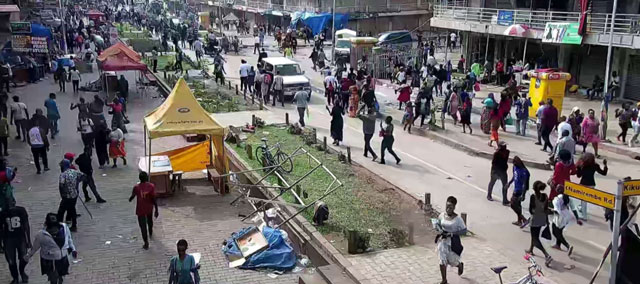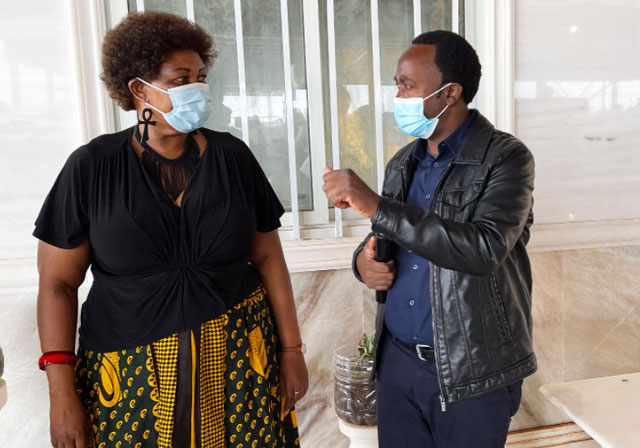
Kampala, Uganda | THE INDEPENDENT | Days to the first anniversary of the November 18th, 2020 riots that resulted into death of more 50 people, many questions remain unanswered. There are no indications that they will be answered soon.
President, Yoweri Kaguta Museveni promised compensation to the innocent riot victims and a government report on the riots. These promises haven’t been fulfilled.
A number of people arrested in the aftermath of the riots are still missing. And there are people such as John Damulira kidnapped by security agencies whose whereabouts aren’t known up to today.
URN interviewed the Uganda Human Rights Commission (UHRC) chairperson, Mariam Wangadya on whether the commission did any investigations, whether it has or can play any role in ensuring that riot victims (those who died or still in prison) get justice and whether it can urge the government to release investigation reports.

Wangadya said her commission was not party to the process in which the president promised to pay compensation to riot victims. Although she suggested that the victims could have been compensated and went quiet, government officials admited that no compensation has been paid out.
The commission, Wangadya says can’t also push the government to release investigation reports about the riots because the government has no obligation to share reports with the public. However, the president promised that a report about riots would be made public.
Question: The commission plays an important role on issues of human rights in Uganda. We had a tense election season last year and the main violence of the season were the November 18th riots. It’s coming to a year after the riots. Did the commission do any investigation and if yes, what did you find out?
Answer: The Commission received a number of complaints to do with the right to life and they were ten in number. These complaints have been investigated and the information I have is that the investigations are almost complete. The complainants were interviewed, some key witnesses were interviewed, documentary evidence was collected, medical examination reports and postmortem reports and others were obtained. And now that the commission is fully constituted, we are going to evaluate the evidence collected and establish whether it meets the threshold for a hearing by the human rights tribunal.
Question: There is a question of people who were arrested immediately after the riots. They are still in prison in Kitalya. They have never been released. Isn’t that a violation of human rights?
Answer: Although I am new in office, I am a Ugandan, I live here and I have capacity to see and understand what is happening. I am aware you journalists have revealed that some of the people who were arrested were actually released in batches, some without being taken to court. Back to the issue of those who you say are still remanded in Kitalya. That to me presupposes they are going through a court process. The law says that as a commission, we do not have jurisdiction to inquire into any issue that is still pending before court. On the issue of bail, its discretionary. It is up to individual judicial officers to determine whether to grant or deny bail to an accused person. I can’t say that refusal to grant to bail to an accused person is a violation of human rights. I do not know what grounds the court martial based on to deny bail to these particular people. After all, as you said, there are some who were granted bail.
Question: We still have some people who were kidnapped and their whereabouts is still unknown. One case is John Damulira who was arrested from Kisekka Market on November 21st 2020. There is another person in Kyotera who was arrested in January and his whereabouts is still not known. The National Unity Platform also has a list of 10 people who disappeared and their whereabouts is not known. What do you say about these disappearances?
Answer: I am hearing this from you, I have never heard of the case of the disappearance of John Ddamulira. I have not heard anything from security forces. I cannot have an opinion on something, which I don’t have sufficient information. I would encourage the family of John Damulira to come and register a formal complaint with us so that we commence formal investigations.
That said, the culture of state enforced disappearances has not been in this country for decades, the more reason I want concrete information. You’re saying the National Unity Platform has a list, they can share the list. Now, I want you to pick interest in the contribution of this party in the November riots because we are not talking about angels. I wish NUP could acknowledge their role in these riots and what they resulted into. I don’t think they even condemned those riots because we should not wear skewed lenses and focus on only the state without talking about violence by other actors.
I want you as journalists to also focus on human rights violations, which are committed by people other than the state. You saw women who were undressed simply because they were wearing yellow, you saw taxis being stopped with women handbags and their phones grabbed. We want all human rights violations to be condemned.
Question: After riots, the state, which has monopoly over instruments of violence went around kidnaping people here and there. Let me take you back to the case of John Damulira. After one year, he has not been produced in court for mentioning of case, for his defense and sentencing. Is the state really dispensing justice to these people?
Answer: You said the state has monopoly of means of violence. I think that is the ideal situation. But is it really factual that individuals other than state agencies don’t have means of violence? Did you see the police woman who was stoned on the head in Kampala? You’re now following the case of Damulira, I want you to follow the case of that police woman; whether she is alive or dead and if she is still alive, what state she is in. Like Damulira, she needs protection of the law and justice. Find out people who stoned this lady, are they security agencies? Are they individuals and were they incited by a political party? For us as human rights commission, we care about human rights of all people and we condemn all human rights violations whether carried out by state or individuals
Question: I have spoken to people in the civil society and political parties who seem to say the commission didn’t play the role it should have played during the tense violent days of the election season. For instance, they say it’s you who should have asked for reports on riots, release of prisoners, compensation of families promised by the president. What do you say?
Answer: Technically, this commission did not exist until September 29th 2021 when we took oath. This commission ceased to be fully constituted with the death of its chairman in November 2019. The commission, which is being criticized did not exist technically. But also the commission members and staff who were in office participated in monitoring the election and prepared a report. It’s not true that the commission did nothing. You have said the president promised compensation to some of the innocent victims of the riots and that their families have not been compensated. I don’t know if your sources are correct. I want you to know that whenever people are paid compensation, they don’t mention it. Most of them will never reveal they are paid. Even here at the commission, we encourage amicable settlement and when the victims get paid, they don’t mention it. You better cross check that information on compensation claim.
Question: I have cross-checked with government offices and everyone says the process is ongoing. Answer: My information is that many people were actually compensated. However, the commission can’t enforce that compensation since it was outside the ambits of our office. That was an offer by the president. But those people are free to bring their complaints to the commission. On this one, we cannot intervene.
Question: As a commission, if you had an opportunity to meet the president, would you remind him of this compensation that he promised?
Answer: No, we cannot because we were not party to any negotiations. We have no idea how many people were promised compensation and who they are. We don’t know how much money he promised them. It would be redundant on our part to purport to remind the president on something we know nothing about. Meeting the president is a privilege. If I met the president, I would talk about concrete issues with sufficient evidence, which I can defend.
Question: The government has never released any report on the November 18th riots, even a one-page report. Would you urge the government to release a report, which it claims to have?
Answer: I am not aware that government usually releases investigation reports on crime as they occur. The government investigates through the police mainly. You mentioned that some people are facing trial in civil courts and court martial. The government acts on their reports through prosecutions. I don’t know that the government must share investigation reports with the public.
*****
URN
 The Independent Uganda: You get the Truth we Pay the Price
The Independent Uganda: You get the Truth we Pay the Price





